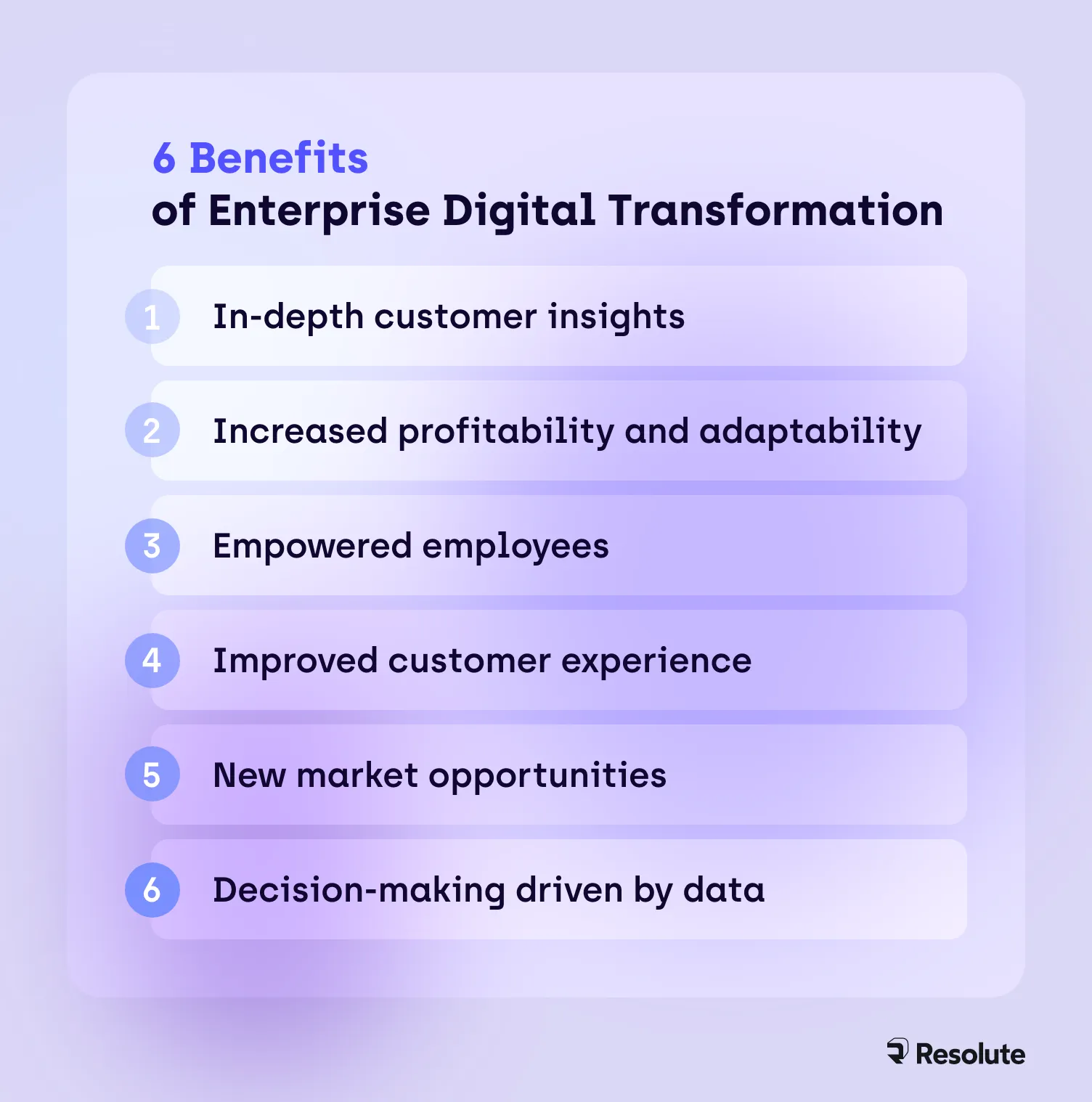
What is enterprise digital transformation?

What digital transformation projects mean for most businesses is the integration of technology into the business throughout all of its teams, processes, and products. Its purpose is to change how the business operates and the value it provides.
For enterprises, however, digital transformation implies a whole lot more. Due to the complexity of their business processes and operations, enterprises are faced with challenges of a different order when transforming digitally.
Naturally, given the higher stakes, the potential rewards are also very high. Successful enterprise digital transformation can catapult a company into the future, and position it at the forefront of its industry, allowing it to set the tone for the competition.
So, what does digital transformation mean for enterprises, why is it important, and what challenges do companies face when transforming? Here’s what you need to know!
Enterprise digital transformation definition
Digital transformation for enterprises refers to the process of strategically integrating digital technologies in order to create an entirely new business model - one that includes the company’s operating business models, business processes, people, and culture.
Greater internal interconnectedness, data-driven decision-making and predictions, an agile, multi-faceted, and customer-centric approach to value creation, significant efficiency improvements, and cost reductions characterize a digitally transformed business.
Given the scale at which enterprises operate, transformation usually entails digital technologies that range from big data analytics, automation, machine learning (ML), and artificial intelligence (AI) to cloud computing, the Internet of Things (IoT), blockchain, and more. Combining all of these into a streamlined and seamless operation is no small feat and requires prolonged preparation and implementation.
Why is digital transformation important for business?
Digital transformation for enterprises is more than just technology adoption. In truth, technology is simply an enabler and catalyst for change. The real sign of transformation is the core change of strategy and operation.
This transformative process is important to enterprises for a number of reasons. On the one hand, there are very real pressures that raise questions about companies’ survivability. Such drivers of enterprise digital transformation include:
- Increased and different customer expectations
- Competitors and big digital disruptors who are challenging and changing the nature of business
- The growing use of smartphones and mobile devices
- The proliferation of cloud technology, AI, big data analytics, and cognitive technologies
In addition to these drivers of change, there is also the element of innovation. Undergoing transformation opens the door for enterprises to new horizons of innovation and the ability to keep redefining the business, its operations, and its products. It is a way to futureproof the enterprise and enable its growth and development for years. With the right digital transformation strategy, business processes almost run on autopilot so you can focus on your business and innovation.
6 Benefits of enterprise digital transformation
While digital transformation entails a significant effort, there is also a significant payoff to be had. Just as change must be at scale, so too are the rewards reaped at scale. Some of the benefits that companies can achieve as a result of a successful transformation include:

In-depth customer insights
Digital transformation inevitably includes improved customer data collection and analysis capabilities. This, in turn, leads to greater insights into customer behaviors, wants, needs, and the ability to forecast trends.
Insights provide the necessary material for companies to develop and offer more customer-centric products and services and to incorporate feedback into the value-creation process continuously.
Increased profitability and adaptability
Where legacy systems previously dominated and determined costs in a relatively fixed way, digital transformation enables cost efficiency.
Cloud-based solutions, automation, improved data storage, and management capabilities - all these allow enterprises to fine-tune costs and flexibly adapt to changing circumstances and needs.
When siloed solutions don’t limit operations but occur within a network of technologies that communicate with each other, profitability increases effortlessly.
Empowered employees
Not only does an enterprise digital transformation project enable greater customer-centricity - it also increases capabilities for employees. Greater technological input and strategic alignment within a company empower employees and provide them with the tools and decision-making power to perform at a higher level.
It also opens the door for them to develop new skills and fill new roles, thereby increasing retention and commitment.
Improved customer experience
The new digital customer experience is here, and it is steadily setting the standards for how companies need to engage with their audience. Digital transformation is one of the main keys to learning the language of today’s customers and engaging them effectively.
Customers today are digital-savvy, always online, and omnichannel. Thanks to data-driven insights, companies can understand customers better and react to them faster while still providing them with a personalized offering and experience.
New market opportunities
With the versatility provided by digital transformation initiatives, access to new markets becomes possible for enterprises. Leveraging digital capabilities enables reimagining and redesigning business models and services and the expansion into new territory.
Decision-making driven by data
Data, particularly big data, and its proper use is one of the core components of enterprise digital transformation success. Thanks to existing capabilities, most enterprises already have troves of data waiting to be analyzed and operationalized.
Once the transformation is complete, data streams can become sources of dynamic insight that enable real-time responses and instill a sense of flexibility where previously there were rigid procedures.
Common challenges enterprises face with their digital transformation initiatives
Enterprises don’t face the same challenges as all other companies. This difference in magnitude creates a different set of challenges without negating lower-order ones.
Common challenges that enterprises must address during their digital transformation include:
Scaling challenges
Implementing digital transformation in an enterprise requires the coordination and alignment of many different units, teams, processes, functions, and more - often across countries and continents.
Serious errors committed early in the transformation process can have a cascading effect down the line unless accounted for. Therefore, facing this challenge demands that companies plan and harmonize all of the above elements extensively prior to execution.
Legacy modernization challenges
Similarly to scaling challenges, the use of legacy systems can significantly impede the push toward greater variety and integration between digital technologies. While a complete substitution of software systems is possible, it may create significant disruption and additional hurdles.
Instead, a more phased approach in which systems are modernized and adapted to work alongside emerging technologies makes the transition easier and costs less in the mid-to long run.
Organizational challenges
Rigid organizational structures and siloed operational units are inevitably challenged when digital transformation begins.
Meaningful enterprise digital transformation necessitates the dissolution and reorganization of operational structures and procedures around a different vision and strategy. These exclude exclusive and isolated operations in favor of greater interconnectedness and cooperation.
Regulatory challenges
Regulatory compliance is a thorny issue for enterprises due to the many, sometimes contradictory requirements that they face. This in itself may create resistance to change due to the difficulties associated with reconciling newly introduced right digital technologies with legal requirements.
Here, too, given the scale of the task and the possible negative consequences of missteps, prolonged planning, and careful implementation are key.
Cultural challenges
Digital transformation initiatives can radically impact and alter an enterprise’s culture, accepted norms, and behaviors. Managing this change consciously and intentionally is, therefore, an important part of the process.
This requires that all parties - employees, management, stakeholders, and others - are brought on board, and included in the process, along with their concerns and needs and ideas about how change can occur.
Building a successful digital transformation roadmap for your enterprise
Creating a digital transformation roadmap can help you plan and navigate the digital transformation journey with greater ease and improve your chance of success.
The purpose of the digital transformation roadmap is to help you assess the current state of your operations, articulate the goal of your transformation, the actions you need to take to achieve it, and the most important milestones you will pass along the way.
To serve you well, the digital transformation roadmap must provide you with detailed answers to the following questions:
- Why does the business need digital transformation?
- How can transformation be achieved with digital technology?
- What resources are necessary to transform successfully?
- What is the timeframe within which you plan on transforming the business?
An enterprise digital transformation roadmap works as a central defining document that you can fall back on whenever you have any doubts or questions about your digital transformation efforts. It holds the vision that you are working towards, along with concrete and clearly defined steps that you need to take to achieve it.
Want to make the most of your digital transformation?
Resolute Software has extensive experience in helping companies undergo digital transformation. From small businesses to multinational organizations, we have successfully helped hundreds of companies create meaningful and lasting change.
Do you want to know more about how Resolute Software can help with your digital transformation initiative? Get in touch, and let’s discuss your transformation needs!
FAQs
Microsoft is a prime example of enterprise digital transformation. The company transformed itself by shifting from being a software-centric company to providing cloud-first and mobile-first solutions. From its cloud computing platforms to its various SaaS solutions, this has helped Microsoft regain its place as a leader.
Three central benefits of digital transformation for enterprises include 1) the development of a customer-centric approach and the resulting increases in customer satisfaction; 2) greater technology integration and the data-driven decision-making (DDDM) this enables; 3) significant improvements in internal company collaboration and innovation, helping to futureproof the company.
Amazon is a prime example of a digital enterprise. Beginning as an online marketplace for books, Amazon has since become the world’s largest e-commerce website. The company is known for disrupting markets, venturing into new industries, and constantly innovating and looking to develop new solutions.
An enterprise digital transformation strategy addresses the development of the company through the introduction and integration of new technological solutions, along with redefining company operations. This requires achieving a good balance between optimization and transformation, setting clear expected outcomes, tracking progress, as well as determining the highest-priority goals.





